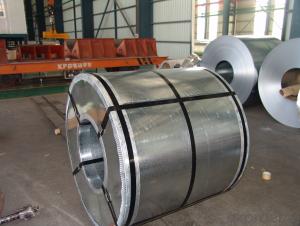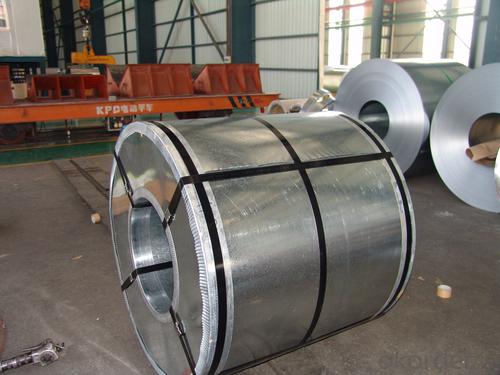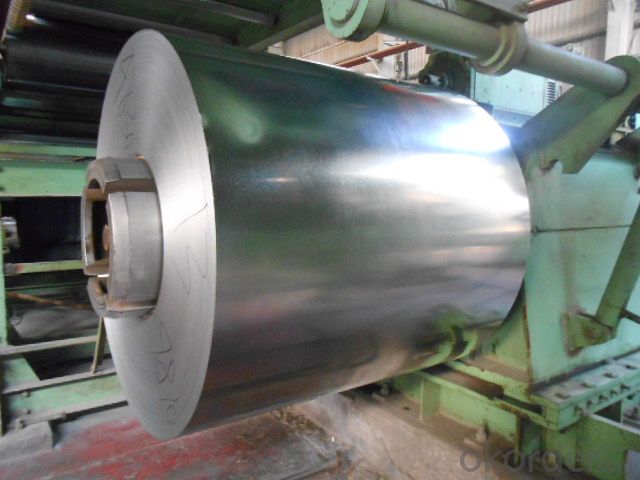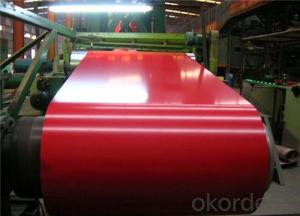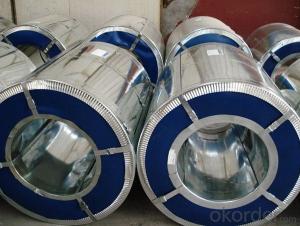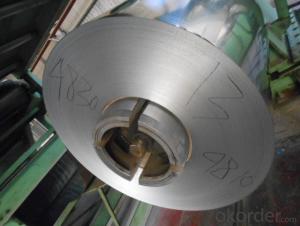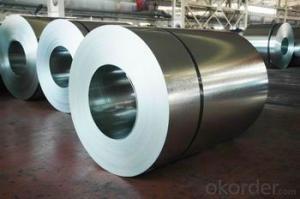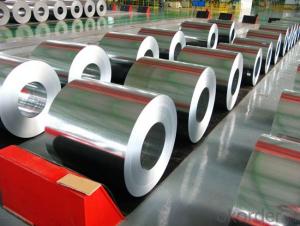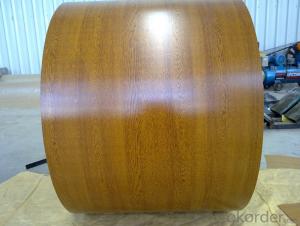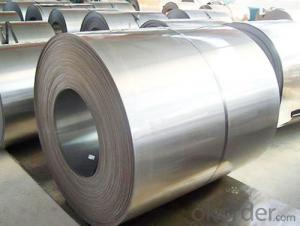Hot Dip Galvanized Steel Coil in Best Quality
- Loading Port:
- Tianjin
- Payment Terms:
- TT OR LC
- Min Order Qty:
- 50 m.t.
- Supply Capability:
- 10000 m.t./month
OKorder Service Pledge
OKorder Financial Service
You Might Also Like
Hot-dip Zinc Coating Steel Building Roof Walls
1.Structure of Hot-Dip Galvanized Steel Sheet Description:
Hot-dip galvanized steel coils are available with a pure zinc coating through the hot-dip galvanizing process. It offers the economy, strength and formability of steel combined with the corrosion resistance of zinc. The hot-dip process is the process by which steel gets coated in layers of zinc to protect against rust. It is especially useful for countless outdoor and industrial applications. Production of cold formed corrugated sheets and profiles for roofing, cladding, decking, tiles, sandwich walls, rainwater protective systems, air conditioning duct as well as electrical appliances and engineering.
2.Main Features of the Hot-Dip Galvanized Steel Sheet:
• Excellent process capability
• Smooth and flat surface
• Workability, durability
• Excellent anticorrosive property
• High strength
• Good formability
• Good visual effect
3.Hot-Dip Galvanized Steel Sheet Images
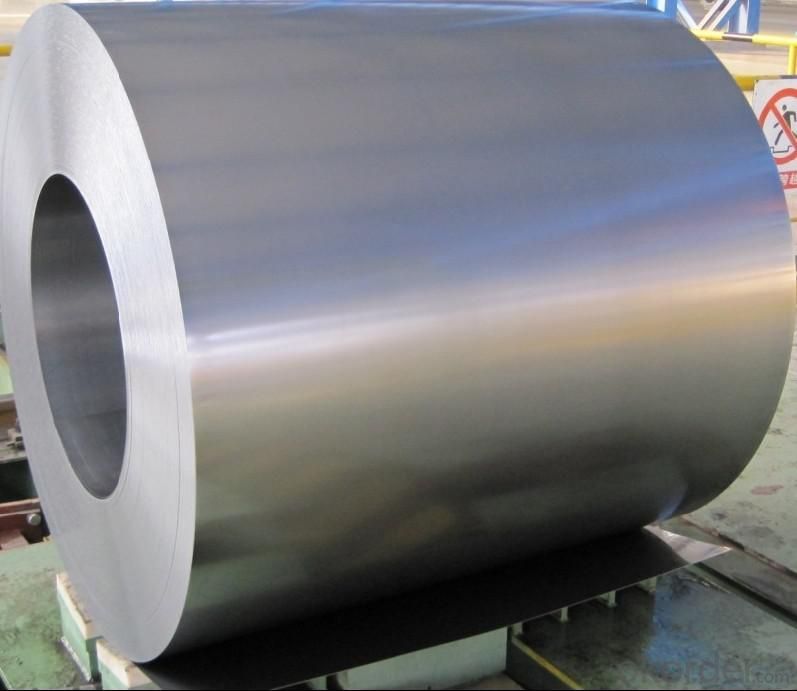
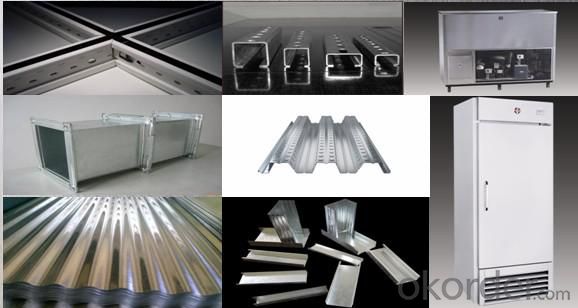
4.Hot-Dip Galvanized Steel Sheet Specification
Standard: ASTM, JIS,EN
Grade: CS, DX51D+Z,SGCC, SS 230~550,S220GD+Z~S550GD+Z, SGC340~SGC570
Thickness: 0.1mm~5mm
Width: max 2000mm
Coil weight:3-12 MT
Coil ID:508/610mm
Surface structure: zero spangle, regular spangle or minimum spangle
Surface treatment: Chromate treatment, Oiled/dry, skinpassed/non-skinpassed
Packing: Standard seaworthy export package
Technology test results:

5.FAQ of Hot-Dip Galvanized Steel Sheet
We have organized several common questions for our clients,may help you sincerely:
1.How about your company?
A world class manufacturer & supplier of castings forging in carbon steel and alloy steel,is one of the large-scale professional investment casting production bases in China,consisting of both casting foundry forging and machining factory. Annually more than 8000 tons Precision casting and forging parts are exported to markets in Europe,America and Japan. OEM casting and forging service available according to customer’s requirements.
2.How to guarantee the quality of the products?
We have established the international advanced quality management system,every link from raw material to final product we have strict quality test;We resolutely put an end to unqualified products flowing into the market. At the same time, we will provide necessary follow-up service assurance.
3. How long can we receive the product after purchase?
Usually within thirty working days after receiving buyer’s advance payment or LC. We will arrange the factory manufacturing as soon as possible. The cargo readiness usually takes 15-30 days, but the shipment will depend on the vessel situation.
- Q: What are the safety precautions when working with steel coils?
- When working with steel coils, it is important to follow several safety precautions. Firstly, workers should always wear the appropriate personal protective equipment (PPE) such as safety glasses, gloves, and steel-toed boots to protect themselves from potential hazards. Additionally, it is crucial to ensure that the work area is clean and free from any debris or obstacles that may cause accidents or tripping. Proper manual lifting techniques should be employed to avoid strain or injury when handling heavy steel coils. Workers should also be trained in the proper use of equipment such as cranes or forklifts to safely transport and store the coils. Regular inspections of equipment and proper maintenance should be conducted to prevent any malfunctions or accidents. Lastly, employees should be aware of emergency procedures and have access to fire extinguishers and first aid kits in case of any unexpected incidents. Overall, prioritizing safety measures and being vigilant can greatly minimize the risks associated with working with steel coils.
- Q: what is magnetic steel used for and if it can be used for producing kitchenwares utenils like stainless steel basines,mugs and bowls.
- Magnetic steel rusts. That's why kitchenware is often made out of stainless. You can't turn magnetic steel into stainless, sorry. Metalurgy is a complicated subject, and is all about different alloys. It's far too involved to explain in a few paragraphs here, but no, they're not interchangeable in this case unless you want to produce kitchenware that rusts.
- Q: How are steel coils used in the energy sector?
- Steel coils are used in the energy sector for various purposes, primarily in the construction and maintenance of power plants and transmission infrastructure. They are commonly used in the manufacturing of turbines, generators, and transformers due to their strength and durability. Steel coils are also used to fabricate pipelines and storage tanks, which are essential for transporting and storing oil, gas, and other energy resources. Additionally, steel coils play a crucial role in the construction of wind turbines, providing support and stability to these renewable energy sources.
- Q: How are steel coils shipped internationally?
- To ensure the safe and efficient transportation of steel coils internationally, various methods are utilized. The most commonly employed technique involves container shipping, where steel coils are placed in standard shipping containers. These containers are specifically designed to handle heavy and bulky cargo like steel coils. To load the steel coils into the containers, they are typically stacked horizontally and secured with steel strapping or metal bands to prevent any movement during transit. This ensures stability and minimizes the risk of damage. Additionally, wooden or metal dunnage may be used to separate and secure the coils, further preventing any shifting. Once loaded, the containers are sealed and transported to the port using trucks or trains. At the port, the containers are loaded onto cargo ships utilizing crane or specialized equipment, such as roll-on/roll-off (RO-RO) vessels or semi-submersible ships. These ships provide a protected environment for the steel coils during the journey, shielding them from adverse weather conditions and potential damage. Throughout the voyage, the steel coils are subjected to various safety measures to prevent corrosion and maintain their integrity. These measures include the application of protective coatings, such as oil or special paints, as well as the use of desiccants or humidity control systems inside the containers to regulate moisture levels and minimize the risk of rusting. Upon arrival at the destination port, the containers are unloaded from the ship and transferred to trucks or trains for further transportation to their final destination. At this stage, the steel coils may undergo customs clearance and inspection procedures before being delivered to the intended recipients. In conclusion, the international shipping of steel coils requires careful planning, secure packaging, and the utilization of specialized containers and equipment to ensure their safe and successful transport.
- Q: Can you weld copper or brass to steel?
- How To Weld Copper
- Q: Does anyone have any idea where I could get a necklace that has the British Steel by Judas Priest logo?
- Great album... British Steel, Um probably check Ebay... I'm not sure if any local stores would have it.
- Q: How do steel coils compare to stainless steel coils?
- Steel coils and stainless steel coils find extensive use in various industries due to their robustness and durability. Nevertheless, selecting the appropriate material necessitates considering some essential distinctions between the two. One of the primary disparities lies in the composition of the materials. Steel coils, primarily comprising iron and carbon, incorporate additional elements to enhance specific properties. Conversely, stainless steel coils contain iron, carbon, and a substantial amount of chromium, which imparts them with distinctive corrosion-resistant attributes. Owing to the presence of chromium, stainless steel coils outperform regular steel coils in their resistance to corrosion, tarnishing, and rust. This renders stainless steel coils highly suitable for applications within environments characterized by elevated humidity, moisture, or exposure to corrosive substances. On the contrary, steel coils are more susceptible to rust and may necessitate supplementary protective coatings or treatments to avert corrosion. Another notable differentiation concerns the visual appearance of the two materials. Stainless steel coils boast a lustrous and reflective surface, endowing them with an aesthetically pleasing allure. They commonly find application in contexts where appearance holds significance, such as kitchen appliances, architectural structures, or decorative purposes. Conversely, steel coils exhibit a matte or dull finish and are frequently employed in industrial applications where visual aesthetics are of secondary concern. In terms of strength, both steel and stainless steel coils exhibit excellent mechanical properties. However, stainless steel coils generally demonstrate greater tensile strength and enhanced resistance to high temperatures. Consequently, they prove well-suited for applications necessitating strength, such as the construction, automotive, or aerospace industries. Lastly, cost represents a factor warranting consideration while comparing steel coils to stainless steel coils. Steel coils generally offer a more cost-effective option due to the lower expense of raw materials and simpler manufacturing processes. Nevertheless, when factoring in the added value of corrosion resistance and longevity, stainless steel coils may emerge as a more economical choice in the long run, requiring less maintenance and replacement. To conclude, steel coils and stainless steel coils possess distinct properties and characteristics, rendering them suitable for specific applications. Stainless steel coils exhibit superior corrosion resistance, a glossy appearance, and heightened tensile strength, while steel coils prove more cost-effective. Ultimately, the selection between the two hinges on the precise requirements of the application, encompassing factors such as the environment, aesthetics, strength, and budget.
- Q: I completed the missions in broken steel like: the one of the rangers, the one of vault 101, the one of the enclave, and several others.are there any more INTERESTING missions?
- Um The ranger mission is not broken steel and Vault 101 isn't either. After completing Broken steel you should go to this guy called griffon in underworld and talk to him about him getting aqua pura(Or aqua cura) Then after he brings you to 2 other quests from this guy called bigsley. Thats all I could find thats interesting. You should go to a place called oasis. Its at the very top of the map, Small quest up there but really cool. Go look it up on youtube if you want. You could also go to paradise falls and kill all the slavers and save the slaves, That gets you a quest and a achievement if you free them. Also the guard at paradise has a quest for you. Also has a achievement, The quest is called strictly business, Its more of a evil karma quest though. if you don't want to be evil just take the cool weapon he gives you then kill him :P, all i can think of right now. if you have a hard time finding places for stuff, Youtube might help. or getting the explorer perk.
- Q: How are steel coils used in the agricultural sector?
- Various purposes in the agricultural sector call for the widespread use of steel coils. One primary utilization is seen in the construction of farm machinery and equipment. Tractors, plows, harvesters, and other heavy-duty machinery are frequently manufactured using steel coils. The exceptional strength and durability of steel make it an ideal material for such applications, as it can endure the challenging conditions of agricultural work. Furthermore, agricultural buildings and structures heavily rely on steel coils in their construction. Steel is renowned for its superior structural integrity, making it a popular choice for barns, storage units, and other agricultural facilities. Steel coils are frequently employed to establish the framework and support systems of these structures, providing stability and long-lasting durability. Moreover, irrigation systems also rely on steel coils in their production. Steel coils are often used to create the pipes and tubes used for water transportation in agricultural irrigation systems. Steel's resistance to corrosion and its ability to handle high-pressure flows make it an excellent choice for this particular application. To summarize, steel coils hold a critical role in the agricultural sector. Whether it be the construction of farm machinery and buildings or the development of irrigation systems, steel's strength and durability make it the preferred material in this industry.
- Q: steel welding with ms steel iron
- Welding austenitic stainless steels to carbon and low alloy steels are established methods in the process and construction industries. Dissimilar metal welds involving stainless steels can be done using most full fusion weld methods, including TIG (Tungsten Inert Gas) and MIG (Metal Inert Gas). Weld procedures using filler (consumable) enable better control of joint corrosion resistance and mechanical properties. In selecting the weld filler, the joint is considered as being stainless, rather than the carbon steel. Over-alloyed fillers are used to avoid dilution of the alloying elements in the fusion zone of the parent stainless steel.
Send your message to us
Hot Dip Galvanized Steel Coil in Best Quality
- Loading Port:
- Tianjin
- Payment Terms:
- TT OR LC
- Min Order Qty:
- 50 m.t.
- Supply Capability:
- 10000 m.t./month
OKorder Service Pledge
OKorder Financial Service
Similar products
Hot products
Hot Searches
Related keywords
